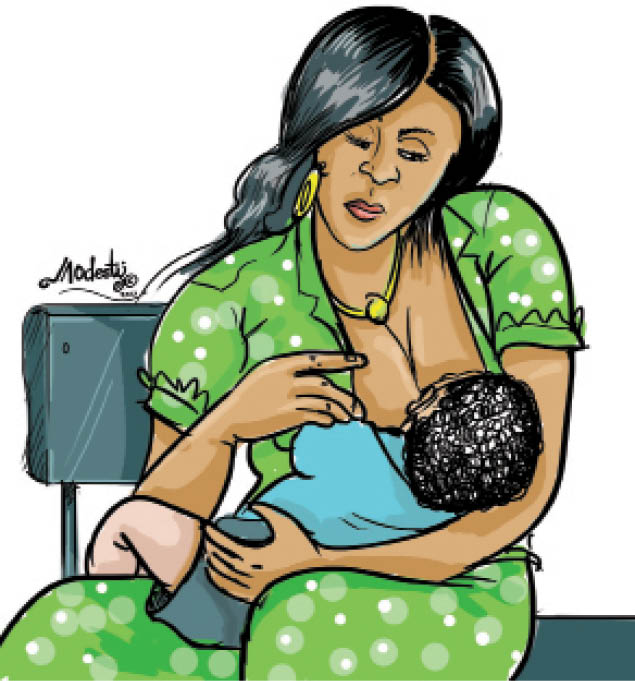Ways mothers, babies benefit from exclusive breastfeeding
And hygiene tips Mrs Alabi’s son is eight months old and his mother started giving him semi-solid food two months ago. She said her son has been very healthy and developing fast so far. “I breast fed exclusively for six months and only gave him water and other semi solids when he turned six months […]

- And hygiene tips
Mrs Alabi’s son is eight months old and his mother started giving him semi-solid food two months ago. She said her son has been very healthy and developing fast so far.
“I breast fed exclusively for six months and only gave him water and other semi solids when he turned six months and two weeks. My son has been very healthy. When other mothers frequent hospital and pharmacies because their children have fever or diarrhoea, my son has been very fine since birth and developing more than children of my friends who give their children formula,” she said.
Agnes Oguntoye, said she has heard about the numerous benefits of exclusive breastfeeding while attending ante-natal classes during her first pregnancy, and made up her mind to exclusively breastfeed her baby when she gives birth.
However, she didn’t lactate immediately after delivery and was advised to give the baby formula. She succumbed because the baby was hungry and kept crying.
Her breast milk began to flow little by little after a day and as the baby sucked, it increased.
She immediately abandoned the formula and exclusively breastfed her child for the next six months. She said she was happy she didn’t listen to those who told her to continue the formula in addition to breastfeeding the child.
Some women also do not exclusively breastfeed their babies because they fear that the babies may reject other supplementary foods after the recommended period.
According to Mrs Beatrice Eluaka, a nutritionist, when a woman gets pregnant, God has already prepared her to be able to feed her baby, saying that is why it is recommended that women be educated on how to exclusively breastfeed during ante-natal.
Exclusive breastfeeding means giving infants nothing else but breast milk, said Eluaka who is also the executive secretary, Civil Society for Scaling Up Nutrition in Nigeria (CS-SUUN).
She said: “That is without adding even water or medicines except otherwise prescribed by a medical doctor. I tell you, an exclusively breastfed baby would not get sick for a doctor to begin to prescribe medicine. When a baby falls sick, it is basically a sign that the baby is not breastfed properly or the mother has given it something else instead of breast milk.
“So, we are saying exclusive breastfeeding should take place immediately the baby is born and the baby should be fed exclusively with breast milk for the first six months. After six months, complementary foods can be introduced but the breastfeeding should continue up to two years and beyond.”
Mrs Eluaka said the baby needs supplementary foods after six months because he or she is growing bigger and requires other things to be strong. She added that it is called complimentary because it is not replacing breast milk.
“At six months the baby is growing bigger and moving around and that requires more energy. At this stage the energy in breast milk is no longer sufficient to sustain the growing child but it still remains an important component for a child’s diet.”
She said breastfeeding is beneficial to mother and child and that breast milk contains all the nutrients that the baby needs in the right amount and in the right consistency as well as water.
“It contains the energy, the protein, the vitamins, the minerals and most especially the water in over 80%. That is why giving water to a baby while practicing exclusive breastfeeding is discouraged. When breastfeeding mothers understand that the content of breast milk is basically water, they will know that they do not need additional water to give the baby. And besides, the source of the water you want to give is not known and that is a way of introducing germs to the child or things that can cause diarrhoea to the child,” she stated.
The nutritionist said breast milk contains antibodies that help babies fight off viruses and bacteria and also lowers babies’ risk of having asthma or allergies. It also tackles the risk of infections, respiratory illnesses and of diarrhoea, she said.
She also said that breastfeeding tends to make babies intelligent, well nourished, and developed as they should, compared to those that are not.
For mothers, she said breastfeeding helps prevent breast and cervical cancers in women, and that when mothers begin to breastfeed, the uterus returns to normal. She said breastfeeding should not be timed like some people who say it should be done every two or three hours but at all times the babies need it, noting that it helps reduce the occurrence of another pregnancy thereby serving as natural child spacing as it delays the return of ovulation
What mothers should note about hygiene when breastfeeding
The nutritionist said, mothers do not need to wash their breast every time they want to breastfeed especially when bathing has already taken place.
“After a mother has taking her bath in the morning, there is no need to start washing her breast again before breastfeeding the baby. By the time the breast is washed may be with soap, the breast becomes dry and the natural oil that helps to glue the baby’s mouth to the breast is removed which does not allow for good attachment.”
She said bonding of mothers and babies arises from physical closeness, adding that skin touching and eye contact during breastfeeding also have benefits.
Mrs Eluaka enjoined mothers to try to exclusively breastfeed their babies and also advised spouses and other family members to give them all the support need to do so.
